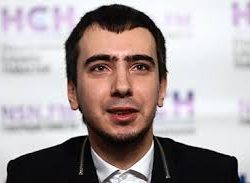Pranker
Vladimir Kuznetsov, better known as the Pranker Vovan, was born on August 17, 1984, in Novorossiysk. There is no available information about his early years and origin, but as he claims, he received a law degree. Kuznetsov began with phone pranks in 2007. In 2011, he moved to Moscow to work in one of the tabloids. At some point, the young man was noticed by people close to the Kremlin, and he began practicing a political prank in the interests of the government. The first fame came to Kuznetsov in 2011, when he made a prank phone call to the then-Chairman of the Central Election Commission, Vladimir Churov. However, Vovan received all-Russian fame by working in a duet with Alexei Stolyarov, Pranker Lexus, against the internal and external opponents of the Kremlin.
In 2016, Kuznetsov and his colleague hosted the Call show on the NTV federal channel. The men were also presenters of the Telephone Guys program at the Komsomolskaya Pravda radio station. The prankers admitted that they had previously received paychecks from the LifeNews propaganda channel.
1. Conscious provocations against political opponents of the Kremlin.
Together with Stolyarov-Lexus, they called the opposition politician Boris Nemtsov (later murdered near the Kremlin), trying to get him crazy, as well as the late Valeria Novodvorskaya, posing as Anna Politkovskaya and Pavel Astakhov, who had already been killed then. However, the most resonant was the conflict between the prankers and the member of the Standing Committee of the Free Russia Forum, Mark Feygin, when he was a lawyer for the captured Ukrainian officer Nadezhda Savchenko. The conflict erupted in March 2016, after the appearance of a fake letter addressed to Savchenko, allegedly from the President of Ukraine Petro Poroshenko. The fake letter said that “the issue will be resolved in favor of the truth soon” and that there is no need for a hunger strike. After it became known that it was the prankers who wrote a letter to Savchenko, Feygin announced his intention to bring the prankers to justice for the violation of the secrecy of correspondence, and they, in turn, tried to provoke Feygin for a fight in one of Moscow cafes. A month later, the investigating authorities of Ukraine opened a case against Stolyarov and Kuznetsov.
2. Anti-Ukrainian propaganda and aiding the occupation administrations of “DPR”, “LPR” and “The Republic of Crimea.”
The activity of pro-Kremlin prankers reached its greatest scope with the outbreak of the Kremlin's armed aggression against Ukraine. They, easily getting phone numbers, called Igor Kolomoisky, Dmitry Yarosh, Mikhail Saakashvili, Vitali Klitschko, and President Petro Poroshenko. After the publication of the call with Poroshenko, the Ukrainian president’s press secretary accused the prankers of working for the Russian security agencies. According to The Guardian journalist Shaw Walker, who investigated prankers, “the vast majority of the victims of their political pranks are Ukrainians, and their work very often corresponds to the tasks set by the Kremlin and brings information that may be useful to it.”
In November 2015, prankers said that they had pranked the initiators of the civil blockade of Crimea, Mustafa Dzhemilev and Lenur Islyamov, and allegedly found out the identity of the person who blew up electric power lines in the Kherson region. A member of the Ukrainian parliament Anton Gerashchenko said in response to the appearance of the “prank-investigation” that its authors work for Russian special services, which organized the power line explosions in the Kherson region, and the evidence they used can be used against Crimean Tatar activists in the annexed Crimea.
3. Provocations against world leaders.
In February 2017, prankers called the NATO Secretary-General Jens Stoltenberg on behalf of the Ukrainian President and some American congressmen on behalf of Prime Minister of Ukraine Volodymyr Groysman, discussing plans for Ukraine's accession to NATO. Later, they called Turkish President Recep Tayyip Erdogan, Belarusian President Alexander Lukashenko, US Ambassador to the United Nations Nikki Haley, and British Prime Minister Boris Johnson. By trolling and using misinformation, prankers Lexus and Vovan provided all possible assistance to the security and intelligence agencies of the Russian Federation, misleading political leaders when the Kremlin had tense relations with these countries, “probing” them for vulnerable positions and provoking them for ambiguous statements.
Phone provocations of Kuznetsov's and his colleague always coincided with the state information agenda, their records were broadcasted in the programs of federal TV channels. All of these conversations were aimed at compromising the victim, discussed as a “sensation” by pro-Kremlin propaganda media. In turn, the propaganda used these attempts to humiliate the opponents of the Kremlin as a form of entertainment for the Russian audience, and the Russian security agencies used them to collect specific information and to form a psychological portrait of the victims, their level of awareness and plans. Consequently, pro-Kremlin prankers should be considered as one of the levers of the sabotage-propaganda, the hybrid war of Putin’s dictatorship against the opposition and the West. According to Mark Feygin, it is highly unlikely that prankers, “who know the phones and emails of top officials from everywhere, are simple small cheaters.”
Links and materials
Пранк вместо разведки. Зачем Москва натравливает шутиков на своих «врагов»
Happy to Be a Weapon: Russian Prank-Callers Target Kremlin Opponents
Kremlin calling? Meet the Russian pranksters who say ‘Elton owes us’
«Пранки» грязи не боятся: кто стоит за розыгрышем лидеров блокады Крыма?
Фейгин: Против российских пранкеров Вована и Лексуса в Украине открыли уголовное дело

